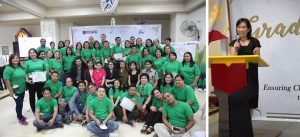
Some 52 houseparents from different residential care facilities managed by the Department of Social Welfare and Development (DSWD), local government units (LGUs) and non-government organizations (NGOs) recently graduated from a 10-day intensive training under the project “Ensuring Children’s Potential for Development and Independence through Improved Residential Care Practices.”
The 10-day training which is intended to enhance the skills of houseparents was organized by the DSWD, ACTION (A Child’s Trust is Ours to Nurture), with support from the Japan International Cooperation Agency (JICA).
The training program is composed of 10 modules that cover 10 critical areas on house parenting, namely Child Rights Perspectives; Self-Awareness, Organizational and External Awareness; Custodial Care; Behavioral Management; Problem Solving; Crisis Intervention; Safety and Security; Record Keeping; and Program Management.
In his message during the Graduation ceremony held recently at the DSWD Central Office, OIC Emmanuel A. Leyco stated, “This kind of activity reflects the high values the Department places on children.”
“How we shape and nurture our children redound on how our country and society will look in the future. Given this, the role of our houseparents is very important. They are the frontliners when it comes to our department’s efforts to help the children who are under the care of DSWD residential care facilities,” he said.
A total of 17 residential care facilities for children participated in the training program. These are broken down into six centers managed by DSWD; six run by LGUs; and five by NGOs.
Some houseparents and trainers shared their experiences during the training, and they put much emphasis on the importance of “serving others with a heart.”
“Naituro sa atin ang lahat ng standard procedures, ngunit ang dapat nating tandaan ay kailangang maramdaman ng mga bata na tayo ay naglilingkod mula sa puso (We were taught all the standard procedures, but we need to remember that children need to feel that we are rendering service with a heart,” shared Richard Estacio from Tulay ng Kabataan Foundation.
On the other hand, Ma. Victoria Oquias, a social worker from Marillac Hills, a center for abused girls, and a member of the training team, emphasized the importance of teamwork.
Further, she underscored, “Our clients are abandoned and neglected children: we must be the ones to nurture and care for them so they will grow up to be productive citizens.”
Challenges and gaps
To date, some 16,574 clients are being served in the different 71 residential and non-residential facilities of DSWD, utilizing P911,228,883.43 from January to October 2017.
Of the total centers, 64 are residential care facilities with 27 catering to children, 14 for women, 15 for the youth, four for older persons, two for persons with disabilities, and two for individuals/families in need or in crisis situations.
These facilities serve those who have been put to a social and economic disadvantage by their circumstances or because they have been victimized by unscrupulous individuals/groups. Among the clients the centers serve are abandoned and/or abused children and elderly; raped and/or trafficked victim ; children in conflict with the law (CICL); homeless and victims of incest; and persons with disabilities.
The work of the staff in the centers is difficult and highly critical as their main objective is to help the clients recover from what they have gone through, and rehabilitate them for their eventual reintegration with their family and community. Interventions in residential and non-residential facilities must be appropriate to the situation of the clients. Because of this, individual case management is done by the social workers.
Houseparents are mostly MOA workers who receive an approximate P11,000 monthly salary.
“Although the work is hard and delicate in our centers and institutions, improvement of the structures came few and far between with fund allocation sometimes not even enough. This year, our total budget for the 71 facilities is P1,416,408,000.00 which is just enough for the most basic expenses. In cases where there are more clients coming in than what is targetted or prepared for in the annual plan, the center heads will have to compensate through tightening their budget. Some of the centers, especially those for children and the elderly, are more fortunate as they periodically receive donations to help them cope with emergency situations,” OIC Leyco expounded.
DSWD also noted other issues which need to be addressed in the efficient management of its centers, primarily the lack of social workers, house parents, nurses, and psychologists for a complete management of the cases of the residents. Engineers and architects are also needed for the enhancement of the facilities.
“We also lack facilities to address the needs of children with special needs, as DSWD manages only two centers for them: the Elsie Gaches Village in Alabang, Muntinlupa, and AMOR Village in Anao, Tarlac. We also do not have enough service vehicles assigned per center and residential care facilities. Service vehicles are very important especially in emergency cases,” OIC Leyco added.
The DSWD management vows to prioritize the improvement of the facilities of the Department in recognition of the distinct and significant contribution to its direct impact to the lives of the residents. ###


